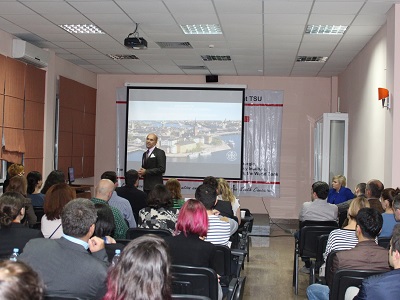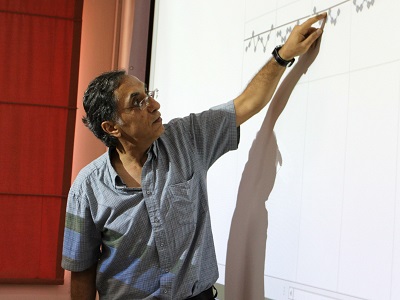On November 2, ISET hosted Francois Painchaud, the IMF Resident Representative in Georgia. Mr. Painchaud presented the 2016 November Regional Economic Outlook for the Caucasus and Central Asia, highlighting three main areas: global and regional environment, outlook and policy actions, and policy priorities.
At the beginning of the presentation, Mr. Painchaud overviewed the main trends in the global and regional environment. Firstly, the IMF predicts lower real GDP growth in 2016 relative to the previous year. This tendency is mainly driven by growth slowdown in the US, Eurozone and China. Secondly, predictions for 2017 are much more optimistic, mainly at the expense of higher growth projections in the US, Russia and emerging markets.
The strength of the Swedish economy is a byword throughout Europe, and, so any lessons learned from Swedish experts will be of the utmost value for developing economies.
On 14 October, ISET hosted representatives from the Stockholm School of Economics, with keynote speakers Dr. Anders Liljenberg (Dean of SSE Russia, Associate Professor at Stockholm School of Economics) and Anna Izmailova (Business Trainer, Head of Sales and Marketing at Stockholm School of Economics Russia) addressing assembled faculty and students. In the first part of their presentation, Dr. Liljenberg and Prof. Izmailova interchangeably introduced the Executive MBA program at the Stockholm School of Economics Russia. This economics school has already 2000 alumni all over Europe; indeed, Prof. Izmailova herself is a graduate of the EMBA program of 2010. In her talk, she stated that studens' professors, classmates and books are the three key factors that makes their learning environment effective.
“You need to think carefully before you jump into this deep sea,” said Professor Daniel Levy at the very beginning of a presentation entitled “Why can a PhD be bad for you?”. While this statement sounded frightening to those who were planning to pursue a PhD or other further studies, it appeared to be more bemusing for others who were not considering a career in academia.
Based on his personal experience, Dr. Levy explained that substantial difficulties come with academic life: a PhD is not a continuation of an MA, and it constitutes an “unbelievable amount of commitment”. It requires “focus, and lots of patience, time and energy”. Dr Levy recalled that during his studies, he took most of his meals sitting in front of a computer or with his nose buried in a book.













